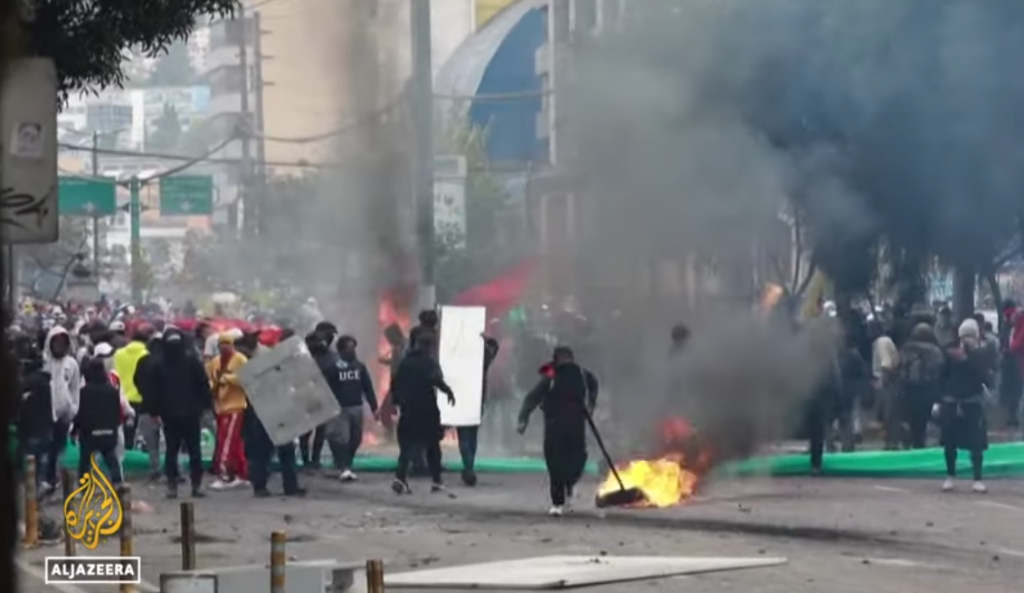by Raúl Zibechi

Colombia, Ecuador and Chile all demonstrate recent processes that are relatively similar. Governments of the neoliberal right confronted long-lasting popular revolts, which opened breaches in domination and put governability in jeopardy. The political system responded by channeling the dispute into the institutional arena, with the approval and enthusiasm of the left.
During the revolts, grassroots organizations were strengthened and new ones were created. In Chile, more than 200 territorial assemblies and more than 500 community kitchens in Santiago when the pandemic was declared. In Ecuador, they had the Parliament of Indigenous and Social Movements, with more than 200 organizations. In Colombia, dozens of points of resistance, there were free zones where peoples create new relationships among themselves.
The results of the institutional option usually become visible some time later, when the power of the uprisings begins to fade and there are almost no grassroots organizations left. The Ecuadorian Parliament no longer functions. The Chilean assemblies have weakened in number and participation. The same is happening in Colombia.
The case of Chile is the most dramatic, since all the power of the revolt was soon neutralized with the signing of an agreement for a new Constitution, although we know that the ultimate goal was to get the population out of the streets, because it is the main threat to the dominance of the economic and political elites.
Chile is the only one of those three countries in which the electoral process crowned someone who claimed to represent the revolt, the current president Gabriel Boric. What more could one ask for? A young man who was active in the student protest and who is part of the new left aligned with Apruebo Dignidad (Approve Dignity).
It is the biggest disappointment imaginable, for those who were betting on a change administered from the top following the protest. It was Boric who signed the pact with the right and the center, with the elitist political class, to convene the constituent assembly. It was he who said time and again that things would change with his government and promised to demilitarize Mapuche territory, Wall Mapu.
Two months after assuming the presidency, he decided to establish a state of emergency in those lands. Just like Sebastián Piñera, the right-wing president hated by half of Chile. Just like all previous governments, including of course the Pinochet regime.
The state of exception is directed against Mapuche activism that recovers land and sabotages extractive companies that destroy mother earth. In particular, it is directed against the Mapuche Lavkenche Resistance (RML), the Arauco-Malleco Coordination (CAM) and the Mapuche National Liberation (LNM), as well as autonomous territorial resistance organizations.
The military occupation of Araucanía responds to the request of truck drivers and large landowners. For Héctor Llaitul, leader of the CAM, it is the full expression of the military dictatorship that we, the Mapuche, have always suffered; while the RML considers that Boric left the new repressive policies in the hands of the Socialist Party, with the endorsement of organized crime (https://bit.ly/3lYSpSC).
It is only worth adding that the economic area was handed over to one of the most prominent defenders of neoliberalism and economic orthodoxy, Mario Marcel. There will be no changes. Just make-up. Boric’s popularity plummeted: 57 percent disapproved of him, a mere two months after taking office (https://bit.ly/3x2dkcz).
Chile is not the exception, but the rule. Something similar is happening in Ecuador, although the presidency was won by the right-wing Guillermo Lasso. In Colombia, unfortunately, the social movement got entangled in the ballot box by disorganizing its own urban territories. A few reflections:
First: electoral politics depends much more on marketing than on programs and proposals. Just as consumerism is an anthropological mutation (Pasolini), electoral marketing reshapes political maps and behaviors from the top down.
Two: power, the real power, does not come from the ballot box, nor is it in parliaments or governments, but far from public visibility, in the ultra-concentrated financial capital, in the invisible 1% that controls the media, the armed forces and police, governments at all levels and, above all, the illegal narco-paramilitary groups that redesign the world.
Three: the elected governments cannot – in the hypothetical case that they try to – touch the interests of the real powers and the powerful. They are shielded behind several armies, state and private, an opaque judicial system and the mainstream media.
Four: it is a matter of taking other paths, not insisting on those that we already know lead only to re-legitimizing the existing and weakening other worlds that are born. Not disputing their power (nor their health, their means, or their education). It is a matter of creating our own. And defending it.
This article was published in La Jornada on June 3rd, 2022. https://www.jornada.com.mx/2022/06/03/opinion/015a1pol English intrepretation by Chiapas Support Committee re-posted by Schools for Chiapas.
